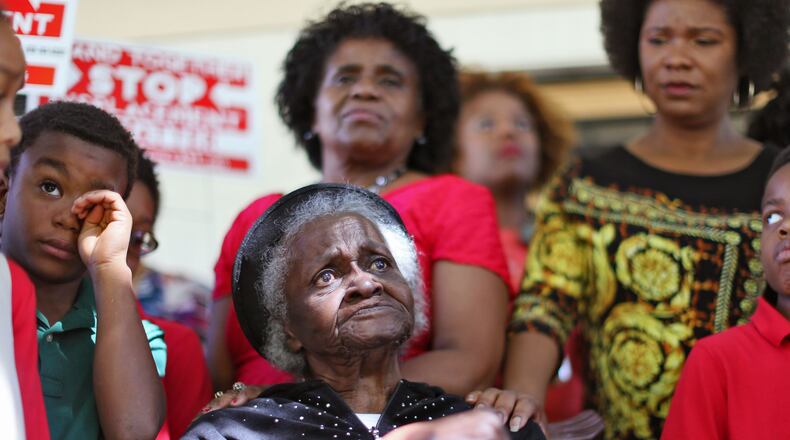Mattie Jackson began her work as an activist at 8 years old, when she crafted her first petition. Nearly nine decades later, she waged her final fight against a powerful force in the halls of Atlanta City Hall.
Unofficially dubbed the “Mayor of Summerhill,” Jackson was known as a matriarchal advocate for her neighbors for over 50 years, especially those who had lived there for a long time.
Jackson, who lived on the border of the Peoplestown and Summerhill neighborhoods in southeast Atlanta and later had to fight to stay in her home, died Saturday. She was 98.
“If there was a problem in the community, (neighbors) would always come to my mom. ... She would find a way to make sure everyone was OK,” said Sheryl Calhoun, one of Jackson’s eight children. “She fought for everyone.”
Jackson worked with everyone, from the neighbors on her street to those pulling the strings in our nation’s capitol. In the 1960s she met with cabinet members from the administration of President Lyndon B. Johnson to help shape legislation to protect the poor and fight poverty in the U.S.
Credit: Bill Torpy
Credit: Bill Torpy
Later in life, at age 93, she challenged the city’s plans to raze her home and several others on the block to make space for a park and retention pond to address flooding in the area. Jackson and other residents contended that the plan was unnecessary and would push longtime residents out of the neighborhood.
“I don’t understand how you can make me leave,” she told the city’s Urban Design Commission in 2016. “I want you to tell me why I have to go. The water doesn’t come into my yard.
Ultimately, former Mayor Kasim Reed’s office conceded that at least one house could stay: Jackson’s.
The saga was the embodiment of Jackson’s influence, commitment to her neighborhood and willingness to stand up to powerful figures. It’s unclear what could happen to her house now, but Calhoun said she plans to continue fighting to keep it.
Over the years, Jackson became an informal adviser to officials and politicians, someone they would visit during election season to get her blessing. Following her death, Atlanta Mayor Keisha Lance Bottoms, several City Council members and council President Felicia Moore all issued statements celebrating her legacy.
“Mrs. Mattie Jackson was the embodiment of perseverance and the very spirit of who Atlanta is as a city,” Bottoms said. “My prayers are with the Jackson family as Mrs. Mattie takes her well deserved rest in her heavenly home.”
Tanya Washington, who moved to Jackson’s block nine years ago, remembered her as the “historian” for the neighborhood.
“She told me so much about my house that I had just purchased, who had lived in it before, Washington said. When it came time to fight for what she believed in, “she was a feisty lady. She did not suffer fools kindly.”
Washington worked with Jackson — whom she called “Miss Mattie” — in the ongoing fight over the city’s plans to tear down houses on Ormond Street. The city has purchased and torn down about 20 houses on the block, while just a handful remain. Washington is one of the residents who has stayed in her home and has not settled with the city; she said they are still involved in litigation.
Washington said Jackson taught her “about the power of community and collective action,” drawing on her decades of experience as a community organizer.
In 1991, Jackson was appointed to the Atlanta Committee for the Olympic Games. Mayor Maynard Jackson insisted that her voice be on the board. She aimed to minimize the Olympics’ impact on the neighborhood, making some tough decisions along the way.
Calhoun said her mother’s five-foot frame didn’t keep her from standing up to Atlanta’s mayors and other elected officials over the years.
“She was not intimidated by anyone,” she said.
About the Author
The Latest
Featured




